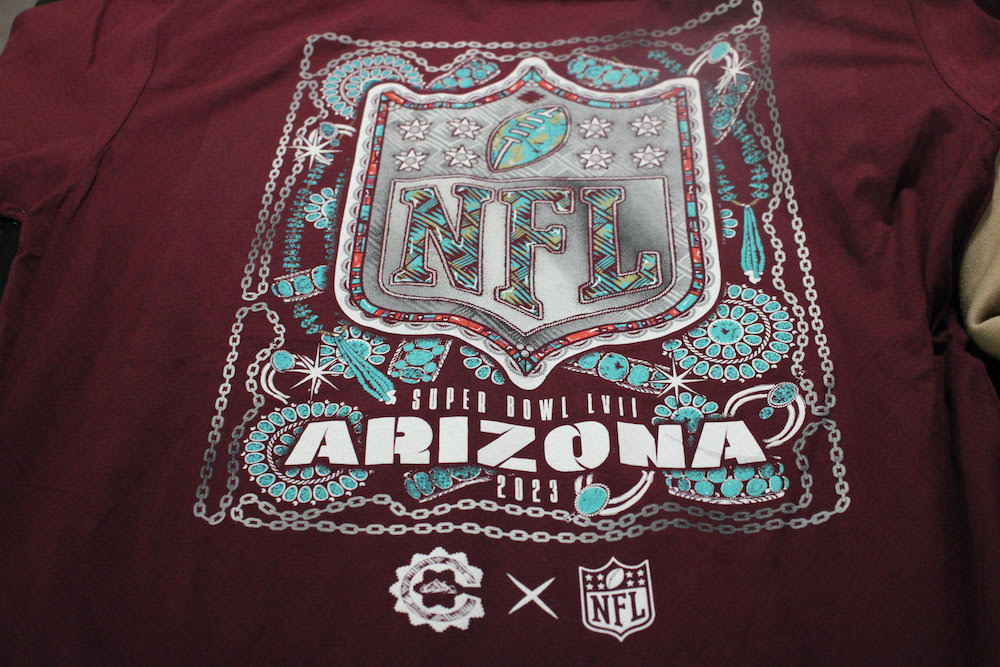
- Details
- By Darren Thompson
TEMPE, Arizona—Indigenous clothing designers are reaching new heights as featured brands in this year’s NFL’s Origins Collection.
OXDX Clothing, and Not Afraid were two of four clothing brands chosen by the NFL’s signature merchandise program that features designers that have ties to the Arizona region.
Designers Jared Yazzie (Diné)and Allie Stone (Diné) of OXDX and Elias Jade Not Afraid (Apsaalooke) designed signature t-shirts, hoodies, magnets, and other merchandise such as water bottles, art prints, bandanas that went on sale this week during the run up to Super Bowl LVII. The NFL’s championship game, which features the Philadelphia Eagles and the Kansas City Chiefs, will be played at State Farm Stadium on Sunday, February 12, 2023, and will be broadcast on FOX at 5:30 pm CST.
“To love this state is to celebrate the mix of people, landscapes, and cultures – these brands all share different ties to Arizona, but their styles paint a picture of the uniqueness every corner of the state has to offer,” says the NFL’s Origins on its website. “What you create is linked to what created you. When you share your art, you share your origins.”
Origins is in its second year and aims to feature clothing designers who are building community through art and fashion in Arizona. Yazzie, Stone and Not Afraid bring their Indigenous art to one of the largest events in popular culture.
The collaboration with the NFL was over a year in the making, Yazzie told Native News Online.
Over multiple exchanges and meetings, Yazzie wanted to bring designs that reflect his Diné heritage. Each shirt includes OXDX’s logo, but also includes images that are inspired by living in the Southwest: turquoise jewelry, a horsehair basket, and cacti on various designs.
After each pressed item of clothing, Yazzie and Stone have to label each item to prepare for shipping to the NFL and Fanatics, an online sports merchandise retailer. Multiply that by hundreds of orders, and the task is daunting. “We’re learning how to do all of that on the go,” Yazzie said.
That steep learning curve has led to little sleep and a crush of media interviews, but Yazzie and Stone are excited and ambitious in their collaboration with the NFL. As of press time, some of the items have already sold out in their store.
Inclusion of Indigenous culture and representation at this year’s Super Bowl has reached a visibility unseen at the previous 51 championship games, including the official game ticket, a pre-game land acknowledgment, a Cherokee Nation citizen who will serve as a game official, and many other displays of Native heritage and talent.
While the NFL is increasing efforts to support diversity in the organization through various accelerator programs, there is one key issue remaining in the organization for many Indigenous people: the Kansas City football team’s history of the use of Native imagery and mascots.
In their preparation for this year’s launch, Yazzie and Stone told Native News they thought about the possibility of the Kansas City Chiefs making it to the Super Bowl.
“We were really hoping it wasn’t going to happen,” Yazzie said. “It would be a lot easier if they didn’t make it, but it happened.”
There is a protest organized to demonstrate the disapproval of the use of Native themed mascots on Sunday, February 12—the day of the Super Bowl—at State Farm Stadium in Glendale, Arizona.
More Stories Like This
Center for Native Futures Hosts Third Mound Summit on Contemporary Native ArtsFilmmakers Defend ‘You’re No Indian’ After Demand to Halt Screenings
A Native American Heritage Month Playlist You Can Listen to All Year Long
11 Native Actors You Should Know
Five Native American Films You Should Watch This Thanksgiving Weekend
Help us defend tribal sovereignty.
At Native News Online, our mission is rooted in telling the stories that strengthen sovereignty and uplift Indigenous voices — not just at year’s end, but every single day.
Because of your generosity last year, we were able to keep our reporters on the ground in tribal communities, at national gatherings and in the halls of Congress — covering the issues that matter most to Indian Country: sovereignty, culture, education, health and economic opportunity.
That support sustained us through a tough year in 2025. Now, as we look to the year ahead, we need your help right now to ensure warrior journalism remains strong — reporting that defends tribal sovereignty, amplifies Native truth, and holds power accountable.
 The stakes couldn't be higher. Your support keeps Native voices heard, Native stories told and Native sovereignty defended.
The stakes couldn't be higher. Your support keeps Native voices heard, Native stories told and Native sovereignty defended.
Stand with Warrior Journalism today.
Levi Rickert (Potawatomi), Editor & Publisher

